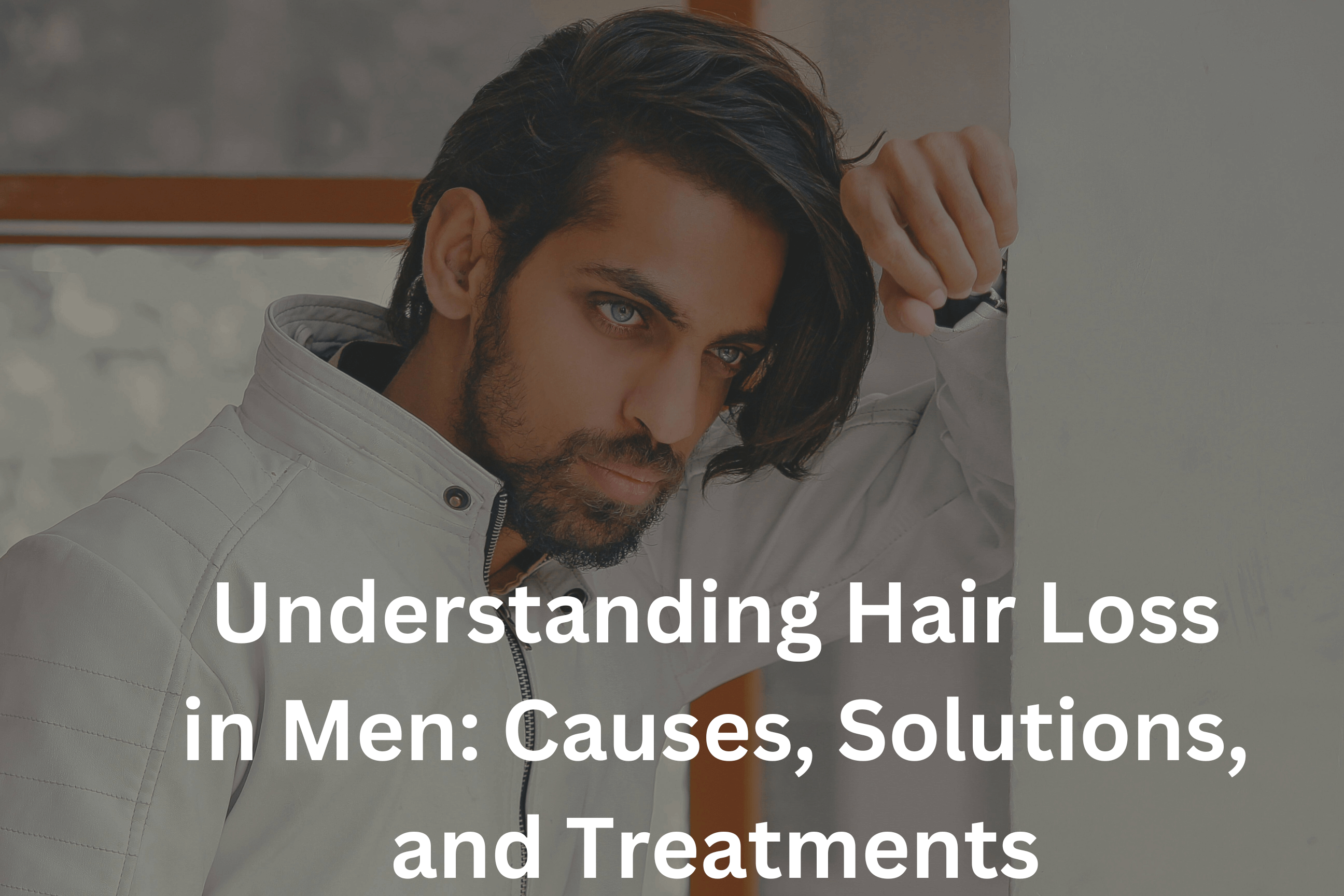Hair loss is a common concern for many men as they age, but it’s not a one-size-fits-all issue. While it is a natural part of the aging process for many, it can also be distressing and impact self-esteem. Understanding the underlying causes and exploring effective treatments can help manage and potentially mitigate the effects of hair loss. This comprehensive guide delves into the causes, symptoms, and various solutions for hair loss in men, offering insight and actionable advice.
What Causes Hair Loss in Men?
Hair loss in men can be attributed to a variety of factors, each contributing to thinning hair or baldness. The most common causes include:
- Genetics (Androgenetic Alopecia): Often referred to as male-pattern baldness, this is the most prevalent cause of hair loss in men. It is hereditary and linked to hormonal changes, specifically the effect of dihydrotestosterone (DHT) on hair follicles. Typically, it begins with a receding hairline or thinning at the crown and progresses over time.
- Hormonal Changes: Hormonal imbalances or changes can lead to hair loss. Conditions such as hypothyroidism or hyperthyroidism can affect hair growth. Additionally, fluctuations in testosterone levels can influence hair loss patterns.
- Medical Conditions: Several medical conditions can contribute to hair loss, including autoimmune diseases like alopecia areata, which causes the immune system to attack hair follicles. Chronic illnesses such as diabetes and lupus also have potential links to hair thinning.
- Medications and Treatments: Certain medications, including those used for treating high blood pressure, depression, and cancer (such as chemotherapy), can have side effects that lead to hair loss. It’s essential to consult with a healthcare provider to explore alternatives if hair loss is a concern.
- Nutritional Deficiencies: A lack of essential nutrients, including iron, vitamin D, and biotin, can lead to hair thinning. A balanced diet is crucial for maintaining healthy hair growth.
- Stress: Both physical and emotional stress can trigger temporary hair loss, known as telogen effluvium. This condition typically results in shedding of hair, which often regrows once stress levels are managed.
- Lifestyle Factors: Poor hair care practices, excessive use of hairstyling products, and smoking can contribute to hair loss. Environmental factors and exposure to toxins also play a role.
Signs and Symptoms of Hair Loss
Identifying hair loss early can help in managing it more effectively. Common signs include:
- Thinning Hair: Noticeable decrease in hair density, particularly at the crown or temples.
- Receding Hairline: A gradual retreat of the hairline, forming an “M” shape.
- Bald Spots: Circular patches of hair loss, often seen in conditions like alopecia areata.
- Excessive Shedding: Increased hair fall while washing or brushing hair.
Treatment Options for Hair Loss in Men
There are various treatment options available, ranging from medical interventions to lifestyle changes. The effectiveness of each depends on the cause and extent of hair loss.
1. Medications
- Minoxidil (Rogaine): An over-the-counter topical treatment that stimulates hair growth and can help in regrowing hair or slowing its loss. It is suitable for use on the scalp and is effective for both androgenetic alopecia and telogen effluvium.
- Finasteride (Propecia): A prescription oral medication that reduces DHT levels, slowing hair loss and promoting regrowth. It is particularly effective in treating male-pattern baldness.
2. Hair Transplant Surgery
- Follicular Unit Transplantation (FUT): Involves removing a strip of scalp from the back of the head and transplanting the hair follicles to the thinning areas.
- Follicular Unit Extraction (FUE): A less invasive technique where individual hair follicles are extracted and transplanted to the affected areas.
Both methods have shown positive results, but it’s important to consult with a qualified specialist to determine the best approach for your situation.
3. Lifestyle and Dietary Changes
- Balanced Diet: Incorporating foods rich in vitamins and minerals, such as leafy greens, nuts, and lean proteins, can support hair health. Supplements like biotin and omega-3 fatty acids may also be beneficial.
- Stress Management: Techniques such as yoga, meditation, and regular exercise can help reduce stress levels and its impact on hair loss.
4. Hair Care Products
- Shampoos and Conditioners: Products containing ingredients like ketoconazole, saw palmetto, and caffeine can help in managing hair loss and promoting scalp health.
- Essential Oils: Oils such as rosemary, peppermint, and lavender are believed to stimulate hair growth and improve scalp conditions.
5. Alternative Therapies
- Platelet-Rich Plasma (PRP) Therapy: Involves injecting a concentration of platelets from your blood into the scalp to promote hair growth.
- Laser Therapy: Low-level laser therapy (LLLT) uses light to stimulate hair follicles and improve hair density.
Preventing Hair Loss
While not all hair loss can be prevented, adopting certain practices can help minimize the risk:
- Regular Scalp Care: Keeping the scalp clean and avoiding harsh treatments can promote healthy hair growth.
- Avoiding Excessive Heat: Minimize the use of hairdryers, straighteners, and curling irons to reduce heat damage.
- Healthy Lifestyle Choices: Maintaining a balanced diet, exercising regularly, and avoiding smoking can support overall hair health.
Learn more about one of the best treatment for hair loss in men in our Provillus for Men Review.
When to Seek Professional Help
If you notice significant or persistent hair loss, it’s advisable to consult a healthcare professional or a dermatologist. They can diagnose the underlying cause of your hair loss and recommend appropriate treatment options based on your specific condition.
Conclusion
Hair loss in men is a multifaceted issue with various causes and treatment options. By understanding the underlying reasons for hair loss and exploring available solutions, men can take proactive steps to manage and address their concerns. Whether through medications, surgical treatments, lifestyle changes, or a combination of these approaches, seeking the right intervention can help in achieving healthier hair and improved confidence. If you’re experiencing hair loss, consider consulting with a specialist to tailor a plan that best suits your needs and goals.


